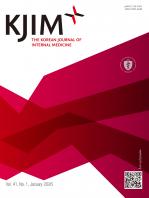|
Infectious diseases / Review
Antimicrobial stewardship programs in sepsis treatment: principles, impact, and future directions
Eu Suk Kim
Korean J Intern Med. 2026;41(1):60-73. Published online December 23, 2025
Sepsis continues to be a serious global health concern with increasing mortality rates owing to antimicrobial resistance (AMR). Antimicrobial stewardship programs (ASPs) have emerged as critical tools for optimizing antibiotic use and reducing AMR. This review examines the applications of ASPs in se..
|
|
|
Infectious diseases / Review
Role of biomarkers in antimicrobial stewardship: physicians’ perspectives
Hyeri Seok, Dae Won Park
Korean J Intern Med. 2024;39(3):413-429. Published online April 30, 2024
Biomarkers are playing an increasingly important role in antimicrobial stewardship. Their applications have included use in algorithms that evaluate suspected bacterial infections or provide guidance on when to start or stop antibiotic therapy, or when therapy should be repeated over a short period ..
|
|
|
Infectious diseases / Review
Implementing antimicrobial stewardship: lessons and perspectives from a university-affiliated tertiary hospital in Korea
Soo Jin Lee, Raeseok Lee, Sung-Yeon Cho, Dukhee Nho, Hye Lim Ahn, Dong-Gun Lee
Korean J Intern Med. 2024;39(3):399-412. Published online April 30, 2024
Antimicrobial stewardship programs (ASPs) can lower antibiotic use, decrease medical expenses, prevent the emergence of resistant bacteria, and enhance treatment for infectious diseases. This study summarizes the stepwise implementation and effects of ASPs in a single university-affiliated tertiary ..
|
|
|
Infectious diseases / Review
Quantitative and qualitative evaluation of antimicrobial usage: the first step for antimicrobial stewardship
Song Mi Moon, Bongyoung Kim, Hong Bin Kim
Korean J Intern Med. 2024;39(3):383-398. Published online April 30, 2024
The identification of antimicrobial use patterns is essential for determining key targets for antimicrobial stewardship interventions and evaluating the effectiveness thereof. Accurately identifying antimicrobial use patterns requires quantitative evaluation, which focuses on measuring the quantity ..
|
|
|
Infectious diseases / Review
Principles and practices of antimicrobial stewardship programs in Korea
Ki Tae Kwon, Shin-Woo Kim
Korean J Intern Med. 2024;39(3):373-382. Published online April 23, 2024
This review addresses the escalating challenge posed by antibiotic resistance, highlighting its profound impact on global public health, including increased mortality rates and healthcare expenditures. The review focuses on the need to adopt the One Health approach to effectively manage antibiotic us..
|
|
|
Infectious diseases / Original Article
Antibiotics use patterns in end-of-life cancer patients and medical staff’s perception of antimicrobial stewardship programs
Min Kwan Kwon, Kyung Hwa Jung, Sungim Choi, Hyeonjeong Kim, Chang-Yun Woo, Mingee Lee, Jeong Geun Ji, Hyo-Ju Son
Korean J Intern Med. 2023;38(5):758-768. Published online August 17, 2023
Background/Aims: While most cancer patients with end-of-life (EOL) care receive antibiotic treatments, antibiotic use should be decided appropriately considering the benefits, side effects, resistance, and cost effects. Antimicrobial stewardship programs (ASP) are important for patients with EOL car..
|
|
|
Pulmonology / Original Article
The impact of antimicrobial de-escalation therapy in culture-negative pneumonia: a systematic review and meta-analysis
Jae-Uk Song, Jonghoo Lee
Korean J Intern Med. 2023;38(5):704-713. Published online August 17, 2023
Background/Aims: Antimicrobial de-escalation (ADE) remains a challenging strategy in the treatment of pneumonia. We investigated the outcomes of ADE as measured by mortality and duration of the use of antibiotics in patients with culture- negative pneumonia.
Methods: We performed a systematic revie..
|
|
|
Review
Urgent need for novel antibiotics in Republic of Korea to combat multidrug-resistant bacteria
Hyo-Jin Lee, Dong-Gun Lee
Korean J Intern Med. 2022;37(2):271-280. Published online February 28, 2022
Multidrug resistance in bacteria is an important issue and is increasing in frequency worldwide because of the limitations of therapeutic agents. From 2010 to 2019, 14 new systemic antibiotics received regulatory approval in the United States. However, few new antibiotics have been introduced in Rep..
|
|
|
Infectious diseases / Original Article
Controlling endemic multidrug-resistant Acinetobacter baumannii in Intensive Care Units using antimicrobial stewardship and infection control
Shinhye Cheon, Mi-Ja Kim, Seon-Jin Yun, Jae Young Moon, Yeon-Sook Kim
Korean J Intern Med. 2016;31(2):367-374. Published online February 15, 2016
Background/Aims: Nosocomial infections caused by multidrug-resistant (MDR) Acinetobacter baumannii have become public-health problem. However, few studies have evaluated the control of endemic MDR A. baumannii in Intensive Care Units (ICUs). Therefore, we investigated the effectiveness..
|
|
|
















